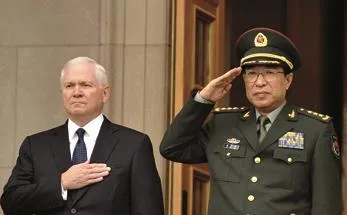Respect, Trust and Engagement
2010-09-12ByLIUXUECHENG
By LIU XUECHENG
Respect, Trust and Engagement
By LIU XUECHENG
China and the United States should accommodate each other’s core concerns to establish military rapport

The Chinese Navy conducted a live ammunition drill in the East China Sea from June 30 to July 5 amid intense speculation by Western media. Held ahead of planned anti-submarine exercises by the United States and South Korea in the Yellow Sea near east China’s Shandong Province, the drill was thought to be Beijing’s response to the joint war games. But Chinese officials denied this, saying it was a routine training program having nothing to do with Korean Peninsula affairs.
Sino-U.S. relations have gone through dramatic fluctuations since the beginning of this year. Their military ties, of course, are no exception. In January, the Obama administration followed on from the $6.5-billion arms sales package unveiled under the Bush administration and announced the United States would sell sophisticated weapons including Patriot III missiles to Taiwan. The move, which challenged China’s core interests, brought the two countries’ newly resumed military exchanges to a standstill once again.
From China’s perspective, arms sales to Taiwan are one of the main stumbling blocks to the development of Sino-U.S. military relations. And it is the United States, instead of China, that has put up the barrier.
A broken promise
In retrospect, the United States has been responsible for the series of suspensions of Sino-U.S. military exchanges since the end of the Cold War. For instance, the U.S. Government invited pro-“independence” Taiwan leader Lee Teng-hui for a visit despite Beijing’s strong opposition in the mid-1990s, giving rise to tensions across the Taiwan Straits. In 1998, U.S.-led NATO forces bombed the Chinese Embassy in Belgrade. Three years later, a U.S. spy plane collided with a Chinese fighter jet while conducting surveillance over China’s Exclusive Economic Zone near south China’s Hainan Island.
Shortly before leaving office, the Bush administration announced an arms sales package to Taiwan in 2008, resulting in another suspension of Sino-U.S. military exchanges. Exchanges were later resumed when Xu Caihou, Vice Chairman of China’s Central Military Commission, visited the United States in October 2009. The two countries’ military relations came to a halt once again following Washington’s move in January this year. The arms sales are unacceptable—particularly considering the United States and its allies have long banned arms sales to China, including dual-use equipment for both military and civilian purposes.
Ma Xiaotian, Deputy Chief of the General Staff of the People’s Liberation Army (PLA), said the United States should take the blame for stagnation in military relations between China and the United States. At the Asia Security Conference in Singapore in early June, he pointed out the United States has put up three obstacles. The first was selling arms to Taiwan of higher quality and greater quantity, posing a direct challenge to China’s sovereignty and territorial integrity. The second is intelligence gathering by U.S. warships and aircraft in the South China Sea and the East China Sea. The third is restricting Sino-U.S. military exchanges in 12 areas by legislation.
The United States promised to reduce its arms sales to Taiwan in the Sino-U.S. August 17 Communiqué signed in 1982, three years after the two countries forged diplomatic ties.
In the communiqué, the United States pledged “its arms sales to Taiwan will not exceed, either in qualitative or in quantitative terms, the level of those supplied in recent years since the establishment of diplomatic relations between the United States and China, and that it intends to reduce gradually its sales of arms to Taiwan, leading over a period of time to a final resolution.” The United States, however, has ever since failed to honor its pledge.

SOS: Chinese and U.S. rescuers sail toward an “endangered ship” during a joint search and rescue exercise by the two countries’ navies in the South China Sea in November 2006
At a Senate hearing on June 17, Democratic senator Dianne Feinstein called U.S. arms sales to Taiwan “a sub-stantial irritant” in relations between Washington and Beijing, and predicted the issue would remain so in the future. Answering Feinstein’s questions, U.S. Defense Secretary Robert Gates said it was up to the Congress and the White House to decide whether to change the way arms are sold to Taiwan. The decision on arms sales to Taiwan is “fundamentally a political decision,” he said.

FORWARD-LOOKING: U.S. Defense Secretary Robert Gates welcomes Xu Caihou, Vice Chairman of China’s Central Military Commission, at the Pentagon on October 27, 2009
All these examples show the responsibility for creating barriers to military-tomilitary relations between China and the United States does not rest with China. The Chinese Government has been urging the United States to fulfill its commitments. Its fury and decisions to suspend military exchanges are understandable given the fact the United States attempts to seize the moral high ground while breaking its own promises.
Transparency disputes
Along with progress in China’s national defense modernization, the United States has focused increasing attention on China’s military power. Its suspicions about the PLA’s strategic intentions have also mounted. U.S. officials have complained about China’s lacking transparency over military matters on various occasions, while demanding the Chinese Government disclose its military budget, new weapons programs and arms purchases.
China believes priority should be given to the objectives and purposes of a country’s security strategy when it comes to military transparency. The PLA has made clear to the world its strategic purposes and objectives by issuing white papers and holding press conferences.
Ma Xiaotian further outlined the objectives of China’s security strategy in the Asia-Pacifc region as: protecting China’s security and development; ensuring lasting peace and common prosperity in the region and promoting regional harmony.
China has always advocated Chinese and U.S. policymakers handle bilateral military relations from a strategic perspective. In other words, the two countries should strengthen military exchanges and cooperation for the sake of maintaining stability in the Asia-Pacifc region and beyond.
The United States, however, remains suspicious. Dubious about the modernization of the Chinese armed forces, it questions the motives and purposes of China’s military development. That’s why it often plays up military transparency issues.
The issue of military transparency continues to haunt Sino-U.S. military relations primarily because of the absence of strategic trust between the two countries. Although both issue documents on defense—China’s national defense white papers and U.S. quadrennial defense review reports—definition serves different purposes respectively. China aims to enhance mutual trust while dispelling suspicions. The United States, by contrast, intends to deter opponents by showing off its military clout.
Without mutual trust, transparency is only a mirage. China and the United States need to fully establish strategic trust before they reach agreements on military transparency.
Breaking the cycle
Since the establishment of diplomatic relations more than 30 years ago, Sino-U.S. military ties have evolved amid suspensions. Both sides hope to break this negative cycle, with little achieved to date.
China views military-to-military relations as an important part of the overall Sino-U.S. relationship and is committed to developing bilateral military ties. Over the past decades, the two countries’armed forces have exchanged high-level visits, conducted defense consultations, and shared professional knowledge. Their navies have held joint search and rescue exercises, in addition to making port calls to each other’s countries. Moreover, a hot line has been established between China’s Ministry of National Defense and the Pentagon.
These developments have not only served the interests of both nations but also contributed to the peace and stability in the Asia-Pacifc region and the world at large.
While China is determined to advance Sino-U.S. military relations, the United States continues to point its fnger at China’s defense modernization. As the two countries’relations move into a new era, new approaches and measures are needed to ensure their military-to-military relations develop in a stable, uninterrupted way.
To that end, Chinese and U.S. militaries should make joint efforts to establish mutual trust through increased exchanges. While reaching out to each other, they should see to it each country’s core interests are accommodated and sensitive issues in bilateral relations are addressed.
U.S. Pledge
…the United States Government states that it does not seek to carry out a long-term policy of arms sales to Taiwan, that its arms sales to Taiwan will not exceed, either in qualitative or in quantitative terms, the level of those supplied in recent years since the establishment of diplomatic relations between the United States and China, and that it intends gradually to reduce its sale of arms to Taiwan, leading, over a period of time, to a fnal resolution. In so stating, the United States acknowledges China’s consistent position regarding the thorough settlement of this issue.
—Article 6 of the China-U.S. August 17 Communiqué of 1982
The author is a research fellow with the China Institute of International Studies
